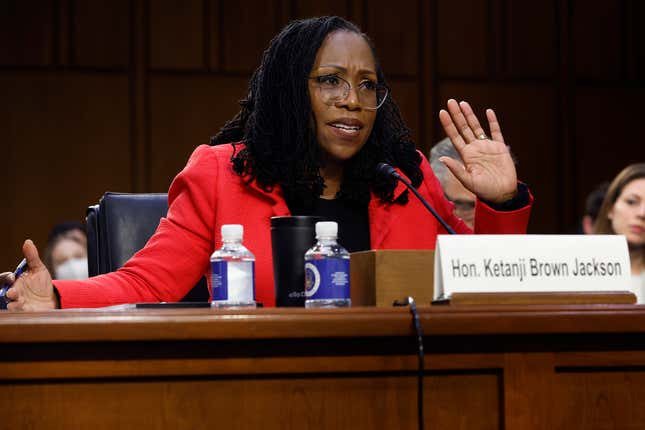‘Fetal Personhood’ Questions to Ketanji Brown Jackson Should Terrify Us
Republicans showed their hands this week: They care about fetuses more than the pregnant people carrying them.
AbortionPolitics

During Judge Ketanji Brown Jackson’s Supreme Court confirmation hearings this week, Republicans on the Senate Judiciary Committee lobbed all sorts of out-of-pocket, truly bizarre questions at the first Black woman to be nominated to the high court. These questions ranged from pure political theater, like Sen. Ted Cruz (R-Texas) wondering aloud whether babies are born racist, to more real and dangerous but equally ridiculous questions like this one from Sen. John Kennedy (R-Louisiana) on Tuesday: “When does equal protection of the laws attach to a human being?”
Texas Sen. John Cornyn posed a similar question on Wednesday: “What does viability mean when it comes to an unborn child, in your understanding?”
We already knew Republican politicians and their conservative allies on the Supreme Court are gunning for abortion rights and the end of Roe v. Wade in this country—look no further than the hundreds of abortion restrictions that have shuttered access to the health service in the last few years, alone. Yet, these questions of fetal personhood reach far beyond just abortion to our rights to IVF, most forms of birth control, emergency contraception, and fundamental privacy rights, in general. The end-goal of anti-abortion activists—many of whom notably reside in Congress and the courts—has never just been sending abortion rights back to the state-level with the fall of Roe. They want to establish fetal personhood, enshrining “equal protection” for fertilized eggs and embryos that necessarily decimates rights for living American women.
“Fetal personhood is about normalizing the idea that a pregnant person is not their own person anymore, that they’re subservient to the rights, individuality, and full personhood of a fetus,” Dana Sussman, deputy executive director of National Advocates for Pregnant Women (NAPW), told Jezebel.
-

-

-

-

-

-

-

-

-

-

-

-

-

-

-

-

-

-

-

-

-

-

-

-

-

-

-

-

-

-

-

-

-

-

-

-

-

-

-

-








































